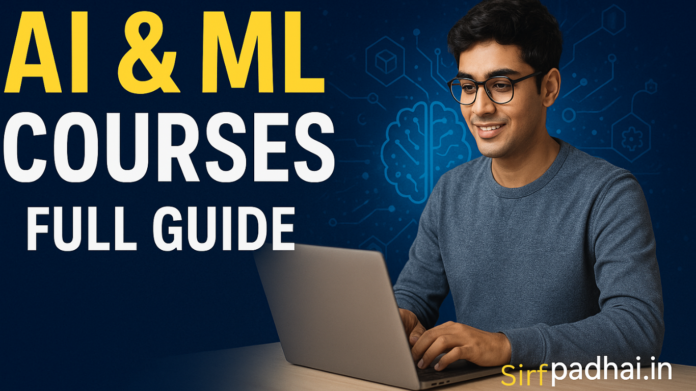Top Machine Learning & AI Courses: A Complete Guide for Beginners and Professionals
Artificial Intelligence (AI) and Machine Learning (ML) are transforming the world faster than ever. From self-driving cars to voice assistants, recommendation systems to fraud detection — AI and ML are everywhere. If you want to build a career in this high-demand field, enrolling in the right course can be your first step. In this blog post, I’ll share a complete guide to the best AI and ML courses, their features, and direct links to help you choose the perfect one.
Why Learn AI and Machine Learning?
- High demand: ML and AI professionals are among the most sought-after in the tech world.
- High salary: According to Glassdoor, the average salary of an AI engineer in the US is over $120,000.
- Career growth: With industries adopting AI, there are roles in data science, NLP, computer vision, robotics, and more.
- Future-proof skill: AI is the future of technology. Mastering it now will give you an edge.
Top AI & ML Courses
1. Machine Learning by Andrew Ng (Coursera)
- Platform: Coursera (by Stanford University)
- Instructor: Andrew Ng (AI pioneer)
- What you’ll learn:
- Supervised & unsupervised learning
- Linear regression, logistic regression, neural networks
- Practical tips for ML
- Duration: ~11 weeks
- Certificate: Yes
- Course link: Machine Learning by Andrew Ng
2. Deep Learning Specialization (Coursera)
- Platform: Coursera (DeepLearning.AI)
- Instructor: Andrew Ng
- What you’ll learn:
- Neural networks
- CNNs, RNNs, LSTMs
- Sequence models
- Optimization algorithms
- Duration: 3–6 months
- Certificate: Yes
- Course link: Deep Learning Specialization
3. AI For Everyone (Coursera)
- Platform: Coursera (DeepLearning.AI)
- Instructor: Andrew Ng
- What you’ll learn:
- Non-technical introduction to AI
- How AI is used in business
- Building an AI strategy
- Best for: Beginners, business professionals
- Duration: 4 weeks
- Certificate: Yes
- Course link: AI For Everyone
4. Applied Data Science with Python Specialization (University of Michigan – Coursera)
- Platform: Coursera
- What you’ll learn:
- Data visualization
- Machine learning using Python
- Text mining
- Social network analysis
- Tools: Scikit-learn, matplotlib, pandas
- Course link: Applied Data Science with Python
5. IBM Machine Learning Professional Certificate
- Platform: Coursera (by IBM)
- What you’ll learn:
- ML concepts with hands-on projects
- Data preprocessing
- Supervised & unsupervised models
- Deploying ML models
- Duration: 3–6 months
- Certificate: Professional Certificate by IBM
- Course link: IBM Machine Learning
6. MIT – Professional Certificate in Machine Learning & AI
- Platform: MIT xPro (edX)
- What you’ll learn:
- Deep dive into ML and AI concepts
- Advanced projects
- Industry-relevant case studies
- Certificate: MIT Professional Certificate
- Best for: Professionals looking for advanced training
- Course link: MIT ML & AI
7. Google AI – Machine Learning Crash Course (Free)
- Platform: Google
- What you’ll learn:
- ML basics
- TensorFlow hands-on coding
- Real-world ML problem-solving
- Duration: ~15 hours
- Certificate: Yes (Free)
- Course link: Google AI ML Crash Course
8. Udemy – Machine Learning A-Z: Hands-On Python & R in Data Science
- Platform: Udemy
- Instructor: Kirill Eremenko & Hadelin de Ponteves
- What you’ll learn:
- Regression, classification, clustering
- Reinforcement learning
- NLP basics
- Deep learning
- Tools: Python, R
- Certificate: Yes
- Course link: Machine Learning A-Z
Tips for Choosing the Right Course
- Beginners: Start with Google AI Crash Course or AI for Everyone.
- Intermediate learners: Go for Andrew Ng’s Machine Learning or IBM ML Certificate.
- Advanced professionals: Opt for MIT or Deep Learning Specialization.
- Hands-on learners: Udemy’s ML A-Z is a great pick.
Final Thoughts
The AI and ML industry is booming, and the sooner you start, the better you position yourself for the future. Whether you’re just beginning or already have some experience, there’s a course on this list that fits your level and goals. Don’t just learn — practice by working on real projects, Kaggle competitions, and open-source contributions.






